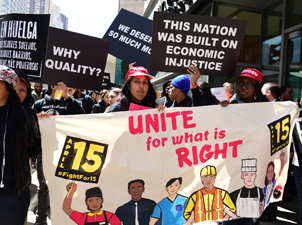
Labor Day 2020: Our Sick Economy and the Need for Structural Change
Laura Peralta-Schulte
September 7, 2020
Pope Francis, in his August 26 virtual general audience said, “The [COVID-19] pandemic has exposed and aggravated social problems, above all that of inequality. These symptoms of inequality reveal a social illness; it is a virus that comes from a sick economy.”
To that I say, Amen.
The reality of inequality in the United States is on full display during this COVID-19 crisis in both subtle and substantial ways. With the exception of “essential” professions, COVID-19 has not negatively impacted highly compensated white-collar workers, particularly those without small children. One simply has to turn on their laptop from the comfort of home to be “in the office.” There is no health risk and even some benefits, like eliminating a hurried commute. Many wealthy, white working parents have found ways to outsource educational and childcare services even in the pandemic, allowing them to continue working while their children receive care. For these workers, exposure to risk is a matter of choice. If desired, the wealthy can both work and get their material needs met from the safety of their home.
At the same time, at the very top of the economic scale, the pandemic has created incredible wealth. In 2020, U.S. billionaires have twice as much combined wealth as the bottom half of Americans – $2.95 trillion versus $1.5 trillion. Just 614 billionaires hold more wealth than the whole bottom half of our country. That is to say: 614 people hold more wealth than 61 million households.
During the first four and a half months of the coronavirus pandemic, while most families were stretching their budgets to stock up on food and other necessities, U.S. billionaires’ wealth grew by $685 billion. As our coalition partners Americans for Tax Fairness point out, this increase in wealth is about 80% of the total sum spent on Medicare for 2020, a lifesaving program which serves more than 62 million people. Medicare and other entitlement programs are routinely attacked as being too expensive and contributing to the national debt. How is it that hundreds of billion dollars is an acceptable sum when it is going to those at the top, but too expensive when it is providing health insurance to millions of people? Which one is a better investment in our nation’s people and our future?
The richest 1% now own half of the value of the U.S. stock market and the top 10% own 92%. This dangerous amount of inequality is causing real problems in our nation, even before the coronavirus pandemic.
Now, however, low-wage workers are suffering tremendously as a result of the COVID-19 crisis, particularly in Black and Brown communities. The pandemic has already killed over 180,000 people in our nation and continues to spread, putting low-wage workers and their families at severe health risk. Low-wage workers and essential workers must leave their homes to continue earning money, and the stress is even greater with children. With the closure of daycare centers and schools and with no ability to afford expensive childcare services, parents face huge challenges.
At the same time, our economy continues to hemorrhage predominately low-wage jobs. There are nearly 12 million fewer jobs in August than in February. More than 30 million workers are still filing for unemployment or are waiting for benefits, including 1.6 million workers who made new claims just last week, an increase from the previous week. Black and Brown communities suffer the highest rates of economic distress; unemployment remains in double digits for Black, Asian, and Hispanic populations. Unemployment reports do not even count the millions of workers who are underemployed or have been pushed out of the workforce altogether. Families risk eviction, food shortages, and toxic stress as they try to navigate the harsh new economic reality caused by the pandemic.
This Labor Day we must ask ourselves a fundamental question. What are our economic structures that allow such tremendous wealth to be held by the few while millions struggle to live in dignity? In 2019, CEOs in the S&P 500 received an average of $14.8 million in annual compensation. The average S&P 500 CEO to worker pay ratio was 264–1, a historic high. These same executives pay lobbyists to break up unions and work against increasing the $7.25 federal minimum wage. The economic status quo rewards a few not the collective. We as a society worship a false idol, the stock market, and measure the health of our economy by its success or failure, while families on the lower end of the economic ladder continue to struggle.
The Gospel and Catholic Social Justice ask us to live differently, to prioritize the needs of community and ensure everyone has what they need to survive and flourish. We as a society are failing; are we willing to follow Jesus’s example and flip over the tables in the temple to call out for justice?
Pope Francis ended his teaching with a challenge for the faithful. “We are experiencing a crisis. The pandemic has put all of us in crisis. But let us remember that after a crisis a person is not the same. We come out of it better, or we come out of it worse. This is our option. After the crisis, will we continue with this economic system of social injustice and depreciating care for the environment, for creation, for our common home?”
This Labor Day, let us pray for the grace to work together for a more healthy, more just, and more perfect union.







